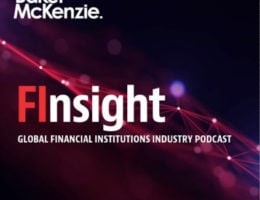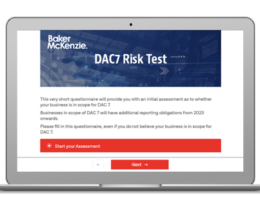The recent increase in value of cryptoassets as an investment class along with media coverage associated with high profile large investors has resulted in regulators warning investors to be cautious of the associated volatility risk. Against the background of these recent developments, we’re seeing increasing demand for legal advice in this area.
Episode 21: COP26 Key Takeaways for Sovereign Wealth Funds
In this episode of FInsight, Andrew Hedges and Kay She from Baker McKenzie’s EMI group in London discuss their experience and observations while on the ground in Glasgow. They cover business imperatives and challenges affecting the global economy and how sovereign wealth funds are well-positioned to influence and make an impact on broader sustainability goals and action plans. As discussions on climate-related issues evolve from commitments to execution in the recent COP26 UN Climate Change Conference, we unpack some of the key takeaways relevant for sovereign wealth funds.
In March 2021, the EU approved new reporting rules in a directive known as DAC7. The directive will require the operators of online platforms for the sale of goods and certain services, to collect, verify and share data on their sellers and their transactions concluded on the online platform. EU member states have until 31 December 2022 to implement DAC7 into national law. Certain platform operators will become a reporting platform and will need to start collecting and verifying data points in compliance with the DAC7 reporting requirements. The collected data points must be reported to the tax authorities of the relevant EU member state annually.
On November 15, President Biden signed the more than USD 1 trillion Infrastructure Investment and Jobs Act into law. Despite substantial criticism and various attempts to amend the bill while it was under debate in Congress, the Infrastructure Act includes two changes to provisions of the Internal Revenue Code that deal with reporting obligations for certain digital assets transactions. Although one of these changes received much more attention than the other.
Taking off from the guide Crypto around the World, the second of two episodes takes a closer look at market abuse, sustainability, decentralized finance and future developments. Sue McLean, a partner in our London office, talks to the team that started this project: Iris Barsan, counsel from our Paris office; Julian Hui, associate from our London office; and Chris Murrer, a US attorney in our Zurich office. They also cover specific regulatory and policy considerations, as well as the future impact of central bank digital currencies.
Episode 19: Crypto around the World (Part 2) Taking off from the guide Crypto around the World, the second of two episodes takes a closer look at market abuse, sustainability, decentralized finance and future developments. Sue McLean, a partner in our London office, talks to the team that started this project: Iris Barsan, counsel from our Paris office; Julian Hui, associate from our London office; and Chris Murrer, a US attorney in our Zurich office. They also cover specific regulatory and policy considerations, as well as the future impact of central bank digital currencies.
In this episode of FInsight, Baker McKenzie partners Daniela Fonseca Puggina from our Miami office and Jennifer Semko from our Washington D.C. office discuss litigation readiness for FIs. The episode also covers potential vulnerabilities and disputes that they need to prepare for, current and emerging trends in litigation (from our Litigation Intelligence Tool and Report), and how they can benefit from litigation preparedness.
On 10 August 2021, the U.S. Senate passed the USD 1 trillion infrastructure bill, known formally as the Infrastructure Investment and Jobs Act (Infrastructure Bill). The Infrastructure Bill includes provisions for approximately USD 550 billion in new federal spending over 10 years on various transportation, broadband, utilities, and other infrastructure projects. The Infrastructure Bill contemplates that USD 28 billion in income tax attributable to the disposition of digital assets will be collected over 10 years.
In the latest episode of the Global Financial Industry Podcast, Baker McKenzie associates discuss: Sovereigns series – key principles of investment treaty protection. The episode covers recent examples of sovereign wealth fundsSWFs bringing investment treaty claims and how others can obtain access to these protections. The episode also analyzes why investors should consider investment treaties as part of their decision-making process.
In this special edition, Eva-Maria Segur Cabanac, a partner in our Vienna office and global sustainability lead for financial institutions, and Jennifer Klass, a partner in our New York office and co-chair of the financial regulation and enforcement practice in North America, talk with Ying Yi Liew on how the COVID-19 pandemic led to the prioritization of Environmental, Social, and Governance (ESG) considerations among financial institutions (FIs).








